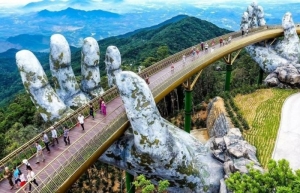Visa exemptions for whole of EU would bring major benefits
EuroCham Vietnam has sent a letter to Prime Minister Pham Minh Chinh, proposing to expand the list of visa exemptions for all EU member countries. Why have you made the proposal at this time?
 |
| Gabor Fluit, chairman of the European Chamber of Commerce in Vietnam (EuroCham) |
We applaud Vietnam’s recent visa reforms, namely the extension of the e-visa validity period and the duration of visa-free stays. This was a critical step.
However, up to this point, only seven EU members are visa exempt, making it a challenge for many European businesses and travellers to go to Vietnam. As a means of leveraging the economic boost brought by visitors in the post-pandemic era, EuroCham believes this is the perfect moment for Vietnam to expand visa exemptions to all EU member states.
This important step would improve the effectiveness of Vietnam-EU cooperation, unlocking wide-ranging benefits through tourism, trade, investment, and cultural exchange.
This initiative to extend visa exemptions has garnered strong support from across Europe, with 18 EU ambassadors to Vietnam and all nine European business associations affiliated with EuroCham co-signing our proposal letter to the prime minister.
Vietnam has an excellent opportunity to reach its full potential and elevate its stature on the global stage by building stronger ties with Europe’s vast common market of over 500 million consumers.
Broader EU access would allow investors, business leaders, and professionals to better understand the Vietnam market by spending more time developing local connections. This is likely to generate valuable new capital inflows, trade deals, and integration into global value chains, providing a major boost to jobs, economic growth and international integration for Vietnam.
Likewise, extending visa exemptions would likely bring millions more European tourists to Vietnam’s scenic landscapes and rich culture. This tourism boom would benefit Vietnamese businesses and workers for years, cementing Vietnam’s stature as a top Asian destination.
How can Vietnam’s tourism industry and the local economy benefit from the visa exemption for the expanded market?
As of 2019, over half of Vietnam’s international tourists came from just three countries – China, South Korea, and Russia.
This heavy concentration from a few markets left Vietnam exposed to external shocks. Widening the pool of source countries would provide stability for Vietnam’s tourism sector while sustaining robust growth.
Compared to other tourists, Europeans also spend considerably more per visit and stay longer in Vietnam. Many European visitors frequently visit Vietnam for up to three weeks at a time, often spending money on luxury hotels, fine dining at world-class restaurants, shopping at upscale boutiques, and exploring cultural attractions.
By opening up access to EU visitors, Vietnam has an opportunity to attract increasing numbers of high-value European retirees who choose to reside in the country for months at a time to enjoy the tropical climate during the winter.
Reducing barriers to EU business and leisure travel will also strengthen trade and investment flows between Vietnam and Europe. Critically, Europe stands as Vietnam’s third-largest export market, after only the US and China. With simplified entry, European companies could further expand the EU-Vietnam business relationship by actively exploring opportunities in Vietnam’s rapidly growing consumer market.
Beyond tourism, streamlined EU access facilitates vital knowledge and skills transfers for Vietnam. Easier entry paves the way for more conferences, corporate travel, training programmes, and collaborative projects between Vietnamese and European partners. These exchanges are crucial to supporting Vietnam’s goals of developing human capital and adopting global best practices.
More partnerships with European companies will directly accelerate skills development in priority sectors like renewable energy, digital economy, and advanced manufacturing.
Access to European expertise and talent through professional exchanges will equip Vietnam’s workforce with the capacity to drive innovation and climb regional and global value chains.
What measures should the government enforce to take advantage of the EU-Vietnam relationship and promote strong growth?
While the Vietnamese government should be praised for recent efforts to simplify visitor visa processes, there is still plenty of room for strategic reforms to fully harness the potential of the EU-Vietnam economic relationship. More ambitious measures are needed to attract European investment, talent, tourists and expertise, which are essential ingredients for robust and sustainable growth.
On boosting tourism, the implementation of e-gates at major airports is an excellent first step towards expedited immigration processing. However, more can be done to dramatically improve efficiency. Specifically, expanding e-gates to all entry points, opening access to temporary residents, and fast-tracking business travellers, residents, and frequent visitors would optimise processes. In addition, providing adequate customs staffing is vital to avoid frustratingly long queues and delays that could discourage tourists.
Marketing is another key priority area. An intensive international strategy is necessary to boost Vietnam’s visibility in key EU source markets. Establishing overseas tourism promotion offices in priority European nations would allow tailored messaging to directly entice travellers based on their interests and values. Campaigns should highlight Vietnam’s stunning scenery, culture, cuisine, welcoming locals, heritage sites, and eco-adventure options, positioning the nation as a top sustainable destination in Asia.
Turning to the overall business environment, securing employment visas and work permits poses persistent difficulties for foreign workers, with over 80 per cent of our members reporting major challenges in our most recent Business Confidence Index (BCI).
Decree No.152/2020/ND-CP’s restrictions make it very difficult to recruit and transfer skilled talent, undermining international investment and Vietnam’s competitiveness. Lifting these barriers is critical to fully capitalise on the EU-Vietnam Free Trade Agreement and draw in EU investment.
We appreciate the dialogues with the Ministry of Labour, Invalids and Social Affairs and local authorities on amending the decree. However, decisive action is urgently needed. Revising it to ease its limitations would demonstrate Vietnam’s commitment to accessing global skills and expertise. We eagerly await an amended Decree 152 that substantially improves access to the talent and human capital necessary for Vietnam’s continued development.
Infrastructure is another priority. European business leaders perceive Vietnam’s infrastructure development as relatively less developed compared to similar countries in the region, according to our BCI. The progress made in moving highway projects forward is commendable and should continue, alongside improvements to rail, ports, logistics, and power infrastructure.
Unclear regulations and cumbersome procedures also remain top foreign direct investment barriers, according to our BCI. This signals a need for transparency, streamlining, and alignment with international best practices.
Have you seen any such visa exemption policy in other regional countries and what lessons can Vietnam learn from them to increase attractiveness?
Above all, Vietnam should emphasise sustainability by incentivising small-scale, eco-friendly tourism developments over large-scale mass tourism projects. This will help preserve Vietnam’s immense natural beauty - a key lesson from regional peers’ missteps.
Tax incentives, streamlined permitting, and promotional support for sustainable tourism providers meeting eco-standards can encourage low-impact businesses like eco-lodges, nature tours, community homestays, and conservation volunteer tourism.
Strict ecological impact assessments could be required for all new tourism developments to minimise damage to pristine coastal, mountain, and jungle environments. Meanwhile, existing mass tourism operations should be pushed to adopt eco-upgrades such as renewable energy systems, plastic phase-outs, and wastewater treatment.
Actively promoting Vietnam’s rich cultural, historical, and natural assets on the global stage is also imperative for sustainable tourism growth. Neighbouring countries have successfully leveraged renowned attractions like Angkor Wat and Borobudur to draw visitors. While Vietnam is blessed with many World Heritage sites such as Halong Bay, Hoi An, My Son Sanctuary, and Hue, simply having famous attractions is not enough.
Vietnam must also actively preserve its treasures through stricter anti-pollution and waste laws, nationwide clean-up campaigns, recycling programmes, and plastic bans in tourism businesses. This will ensure the beauty of landscapes and monuments remains unspoiled for generations. The long-term viability of tourism depends on Vietnam proactively protecting its environmental and cultural heritage.
 | Foreign tourists could soon enjoy visa exemptions again The Ministry of Culture, Sports and Tourism proposed to relaunch visa exemptions for visitors from 24 countries and territories to promote the demand in the tourism sector. |
 | EuroCham calls for broader visa exemptions to boost EU tourism The European Chamber of Commerce in Vietnam (EuroCham) has addressed a letter to Prime Minister Pham Minh Chinh, urging the expansion of the visa exemption list to include all 27 member states of the European Union (EU). |
What the stars mean:
★ Poor ★ ★ Promising ★★★ Good ★★★★ Very good ★★★★★ Exceptional
Related Contents
Latest News
More News
- SK Innovation-led consortium wins $2.3 billion LNG project in Nghe An (February 25, 2026 | 07:56)
- THACO opens $70 million manufacturing complex in Danang (February 25, 2026 | 07:54)
- Phu Quoc International Airport expansion approved to meet rising demand (February 24, 2026 | 10:00)
- Bac Giang International Logistics Centre faces land clearance barrier (February 24, 2026 | 08:00)
- Bright prospects abound in European investment (February 19, 2026 | 20:27)
- Internal strengths attest to commitment to progress (February 19, 2026 | 20:13)
- Vietnam, New Zealand seek level-up in ties (February 19, 2026 | 18:06)
- Untapped potential in relations with Indonesia (February 19, 2026 | 17:56)
- German strengths match Vietnamese aspirations (February 19, 2026 | 17:40)
- Kim Long Motor and AOJ Suzhou enter strategic partnership (February 16, 2026 | 13:27)

 Tag:
Tag:




















 Mobile Version
Mobile Version